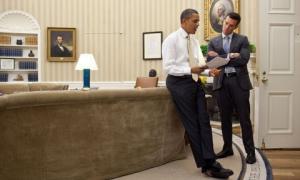Speechwriters, televised
November 30, 2017
By refusing to stick strictly to matters of rhetoric, were the ex-White House scribes behaving badly in the spotlight—or acting responsibly?
If you had something better to do on Saturday night than to watch the airing of the “All the President’s Pens” from last month’s Professional Speechwriters Association World Conference, then surely you don’t have anything better to do today.
I’ve seen and convened versions of this White House speechwriting panel with a number of the same players over many years. Usually the discussion is characterized by remarkable civility among speechwriters of different political ilks. Lots of intimate war stories, droll humor and warm appreciation of the cross-political strangeness of being a speechwriter, in the White House, or anywhere else. Any disagreements are strictly civil, and any arguments rational and not emotional.
This year, not so much. The polite tension at the start eventually, inevitably, gave way to statements that seemed strident in the context of professional collegiality, body language that suggested contempt or exasperation and an unwillingness or inability to stick strictly to the rhetorical aspects of the political conversation. At one point, moderator Robert Schlesinger asks the panelists what advice they would give the current team of speechwriters at the White House. “Quit your job,” said former President Carter speechwriter Robert Rackleff. His sentiment was echoed by former President Clinton speechwriter Jeff Shesol and also former President Obama speechwriter Sarada Peri—but not, decidedly, by any of the speechwriters to Republican presidents going back to Nixon.
And the disagreements got only sharper from there.
And though this was decidedly a debate and by no means a food fight, several speechwriters at the cocktail party afterward told me they were shaken by what they saw on the panel: If professional rhetoricians can’t have a civil, nonpartisan debate about American politics, then who in this country can?
But it’s also true that there are times and places when professional collegiality, good humor and sticking to one’s specialty miss the point entirely.
As I wrote earlier this year, White House speechwriters once thought of themselves—and often behaved—as responsible intellectuals, who offered disciplined counsel on policy decisions, rather than just the words to make them palatable.
At a moment when responsible intellectuals are not growing on trees, perhaps it is time not for speechwriters on both sides of the aisle to regain their composure, but for them to think about ways to take back the territory they have gradually ceded to the policy wonks and chiefs of staff.
Ex-speechwriters are no longer shy about offering their opinions on matters far beyond the rhetorical. Maybe working speechwriters should regain their voices too. —DM


